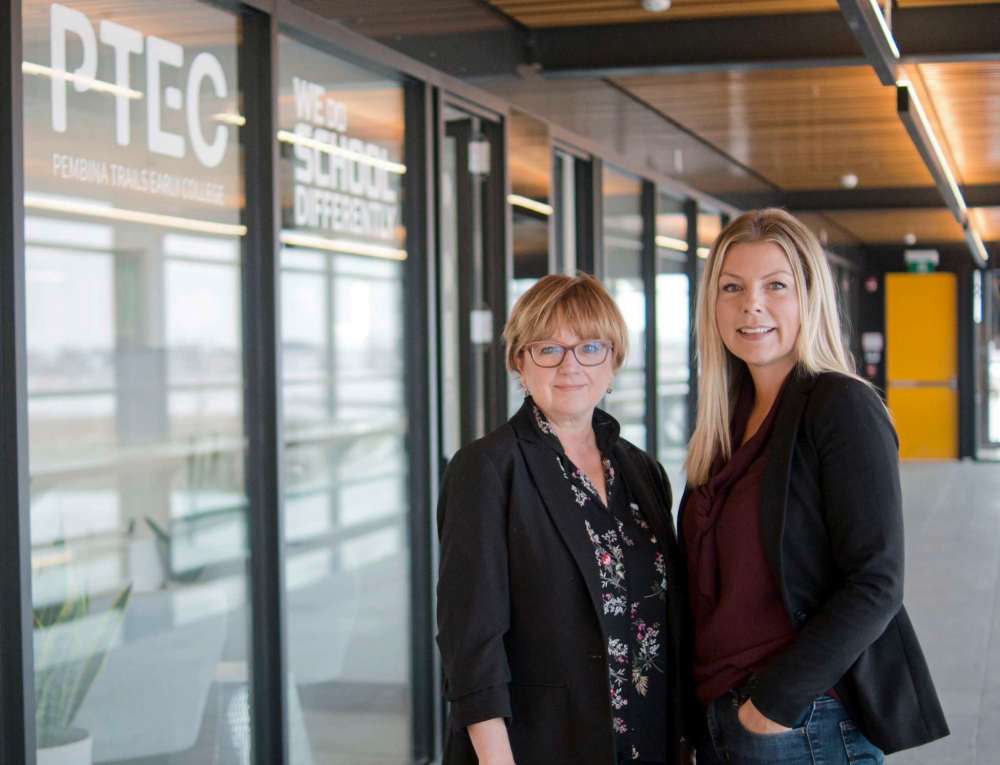Collaborative tech school for ‘future-proof’ students
Technology at core of new vocational high school
Advertisement
Hey there, time traveller!
This article was published 18/11/2019 (2193 days ago), so information in it may no longer be current.
A blueprint for technology education in Manitoba’s public schools is being drawn up by a group of educators and industry professionals within the Innovation Hub at the University of Manitoba’s Smartpark.
In its second year, the Pembina Trails Early College has a class of 30 students in Grade 9 and two dozen more in Grade 10 who spend half their day dedicated to computer science studies, networking, coding, and on technology-focused seminars.
“We knew that we needed to change the way we’re delivering technology education,” said Jane Bachart, principal of PTEC. “It’s hard to keep up with technology, and I think everyone is understanding that there is a huge need for this.”

Launched in 2018, the four-year program developed by Pembina Trails School Division in collaboration with Tech Manitoba and the Manitoba Institute of Trades and Technology offers high school students an accelerated path into the information technology industry.
Young coders learn basic computer science principles in the first two years while taking their core courses at nearby high schools. In Grades 11 and 12, the students move to the Manitoba Institute of Trades and Technology, where they pursue a post-secondary diploma in cyber defence and cloud computing or a software developer certificate, and their high school diploma.
Bachart said PTEC is designed for students who excel at computer science and coding beyond what’s covered under the conventional curriculum.
“Students should identify with PTEC; they should say, ‘That was built for me. I have to go,’” Bachart said. “They have to have a passion for technology.”
Hamza Elafifi is in his first year at PTEC and hopes to one day become a neurosurgeon. The 14-year-old from South Pointe said his experience with information technology was limited before entering PTEC and believes the skills he is developing will give him a head start when he graduates high school.
“You can incorporate coding into anything and coding is driving technology, and technology can be used for anything,” Elafifi said.
“PTEC is a great opportunity to be something great in the world.”
PTEC currently has a waitlist of 35 students and, according to officials, Grade 10 students are performing at a level comparable to second-year university computer science students.
Kathy Knight, chief executive officer of Tech Manitoba, said her team along with leaders at MITT and Pembina Trails were inspired by the Pathways in Technology Early College High School program by IBM and its promise to narrow the skills gap in the tech industry. It is currently offered at over 200 schools worldwide.
“The way that IBM came upon it was they were seeing that there was a lack of talent in STEM coming up through schools and post-secondary,” Knight said. “It was for us, evident that this was a highly effective model.”
In the PTEC model, industry is called on to provide mentorship, work experiences, lectures, and experiential learning opportunities for students, Knight explained, and as such required a buy-in from local professionals to make the program successful.
“Right now we’ve got about 30 companies signed up to play a range of roles,” Knight said. “Part of our job is to market PTEC across the province, evangelize it, if you will in the communities, to support the participants in the PTEC network.”
Going forward, Knight said Tech Manitoba is working with the province of Manitoba and IBM to develop a memorandum of understanding to bring five IBM affiliated P-TECH schools to the province.
“We see this as the future of education in Manitoba. This is the right model particularly for our sector and this is the way we’re going to grow our industry,” Knight said. “It’s what I think is a framework for private-public partnerships: industry, government, and education combined, working together to really provide youth with an opportunity and create future-proof kids.”




